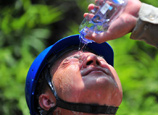
NAIROBI, July 11 (Xinhua) -- At least 181 people have been killed and 217 others injured in the inter-communal conflict in Kenya since January, the UN humanitarian agency said in its latest report released in Nairobi on Thursday.
The latest report by UN Office for Coordination of Humanitarian Affairs (OCHA) Eastern Africa said the inter-tribal clashes have also left over 52,000 people newly displaced from their homes across the East Africa nation.
"The government in collaboration with the Kenya Red Cross Society and NGO partners is providing humanitarian assistance, with support from international partners," Matthew Conway, spokesperson for the East African bureau of OCHA, told Xinhua on Thursday.
OCHA attributed recent localized clashes to competition over political representation, land and resources and the most affected areas are in North Eastern, Rift Valley and Western provinces.
According to the OCHA statistics, more casualties were mainly from northern Kenya where inter-ethnic clashes between feuding communities of Garre and Degodia left at least 70 people dead.
Tension and conflict between the two communities have historically resulted from competition for natural resources, but recently the emerging tensions are attributed to political disagreements over governance issues under the new devolution structures.
The area has been unstable since the March general elections in which the Garre community received most of the elective seats with worst affected are areas being Wajir County, Banisa and Rhamu constituencies.
According to the statistics, Rift Valley which recorded high incidents of cattle rustling and other conflicts had 48 deaths; Coastal region had 36 deaths and 15 in Western province.
The UN humanitarian agency also recorded six deaths in Nyanza region, four in Nairobi and two in Eastern provinces.
Conway said the Kenya Red Cross Society and partners are on the ground providing humanitarian response and international support which is subject to access.
"The (agencies) are providing food, shelter construction, medical evacuation and assistance to IDPs in collaboration with the government," he said.
The OCHA official said numerous international NGOs, in addition to national NGOs, are also providing assistance.
"The UN is providing funding to numerous humanitarian actors on the ground. The World Food Program is providing food through local partners," Conway said, adding that humanitarian access and operational constraints remain a challenge to effective humanitarian response.
The UN humanitarian agency said the government has deployed security forces and commissioned disarmament exercises in the affected areas, adding that conflict mitigation efforts have also been initiated at the local level.
"Humanitarian partners continue to call on all concerned to comply with applicable national and international humanitarian law principles in their efforts to restore peace and security in the affected areas," he said.
According to the report, humanitarian access to beneficiaries remains a challenge due to insecurity, thus affecting provision of and access to services by both humanitarian workers as well as affected people.
"Health centers have been abandoned, and those available lack supplies and personnel. Ongoing nutrition programs have been affected. Critical cases are being evacuated to Mandera and Nairobi," said Conway.
He said shelter is a major concern, as many people are sleeping in the bush or police centers fearing for their security, noting that numerous schools are closed due to insecurity, preventing access to education for children.
















 Rainstorms flood more than 10,000 cars in underground garages in Wuhan
Rainstorms flood more than 10,000 cars in underground garages in Wuhan


![]()
